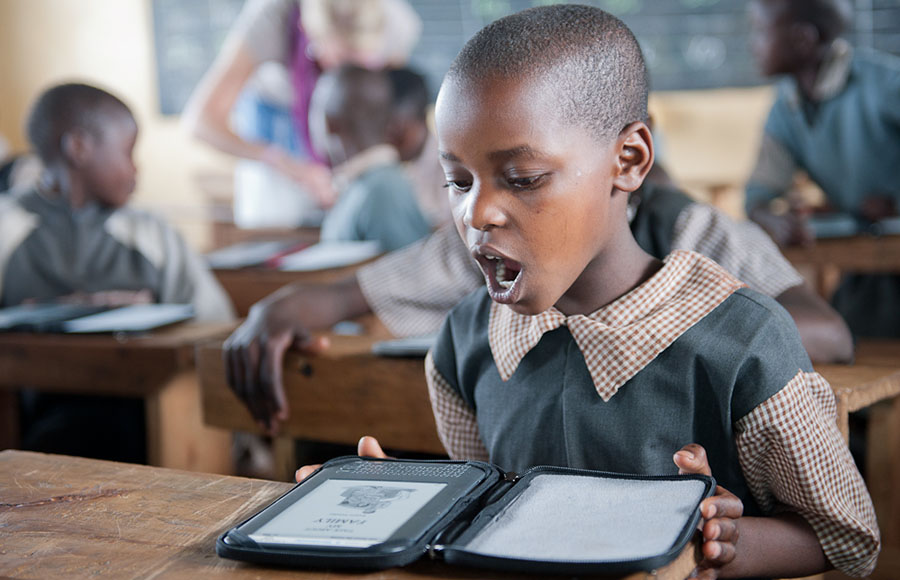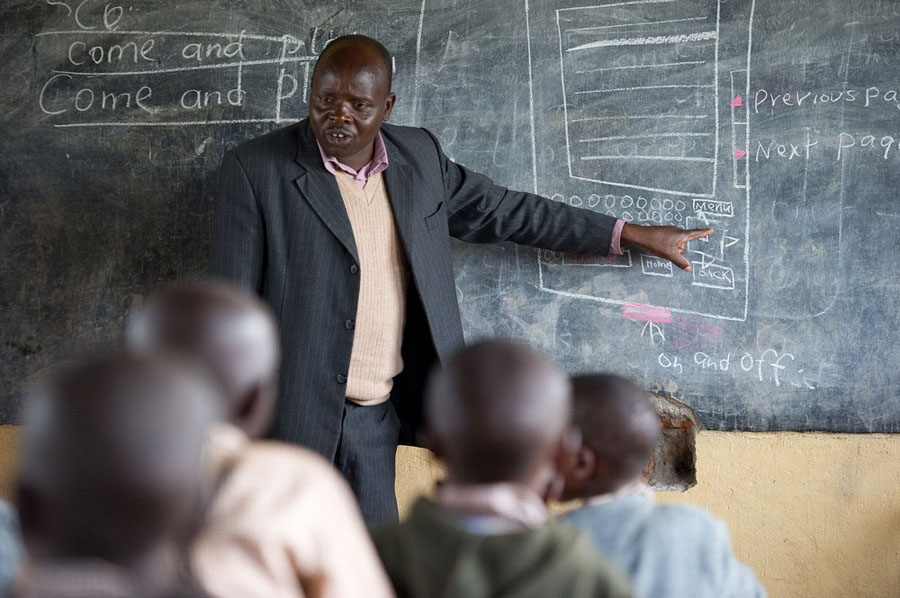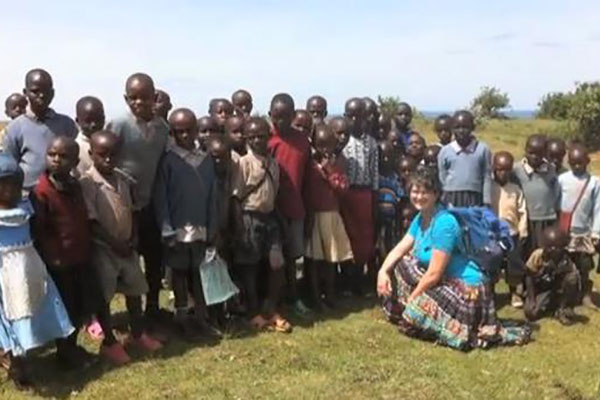BOONE, N.C. — Sara Rhyne took a circuitous route to her job as the instructional technology facilitator with Davie County Schools. It's lucky for teachers and students halfway around the globe that she did.
The Appalachian State University graduate recently traveled to Kenya twice with Worldreader, a nonprofit agency founded to help increase access to books by distributing digital books in developing countries.
While researching the use of electronic readers in the classroom, Rhyne saw a Worldreader contest in which the winner would accompany the agency to East Africa to help distribute the devices and instruct teachers how to use them in their classroom.
Her winning entry focused on skills she acquired in the instructional technology and library science graduate programs in the Department of Leadership and Educational Studies in Appalachian's Reich College of Education. In 2010, Rhyne traveled to Cochabamba, Bolivia, with other students in the Master of Library Science (MLS) degree program to furnish books to the only children's library there, as part of a library science service-learning elective course that has been offered since 2005. Rhyne will graduate from the MLS program in August.
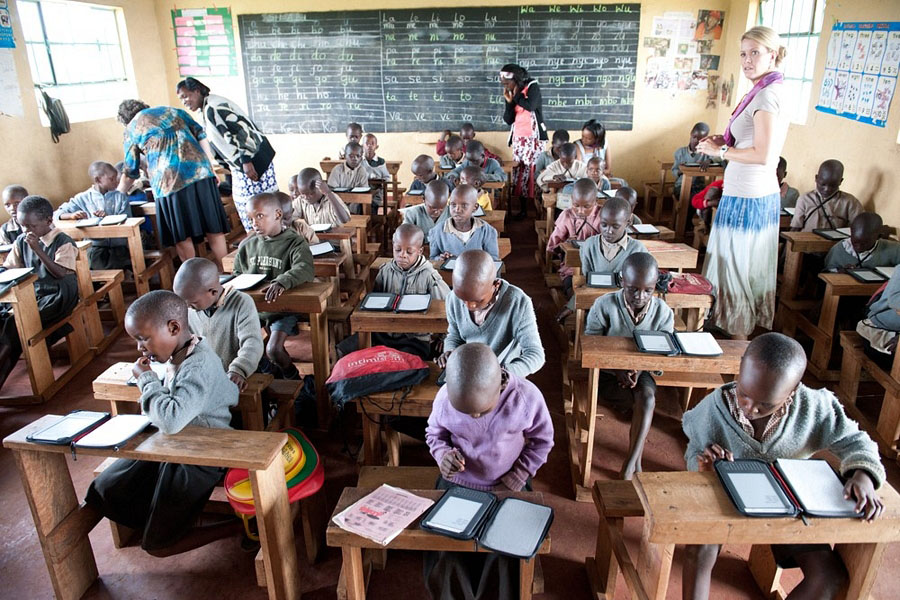
Children in the Ntimigon School in Kilgoris, Kenya, read from electronic readers provided to them through a project to distribute digital books in developing countries. This was the first time every student at the school had access to the same fiction literature. Image by Jon McCormack and provided through a Creative Commons License
The theme of her video was how reading global literature can help develop world citizens and an understanding of other cultures. While the contest winner originally was to go to Ghana, Worldreader officials decided Rhyne's expertise in training teachers how to use technology was a better match for their Kenya project.
The initial two-week trip to Kilgoris, Kenya, in May, during which Rhyne taught teachers how to use the electronic readers for instruction, led to a follow up two-week trip in June, during which Rhyne worked with students in the first through third grades in the Ntimigon School, one of five schools built and operated through The Kilgoris Project.
"This is the first time every student at Ntimigon has had access to the same fiction literature," Rhyne said. That concept is foreign to most people in the U.S., where books are readily available in county or city libraries as well as in schools. In Kenya, only textbooks are available to all students.
The electronic readers were loaded with a mix of literature by Kenyan authors written in the students' native language as well as classics from the English-speaking world. Many students arrive at Ntimigon primary school knowing Maa, the traditional Maasai language. In the classroom, both Kiswahili and English are instructed formally.
Teachers and students also were introduced to the concept of "free reading time," something now possible with the many books contained in an electronic reader. Students can use the readers in class and in their home.
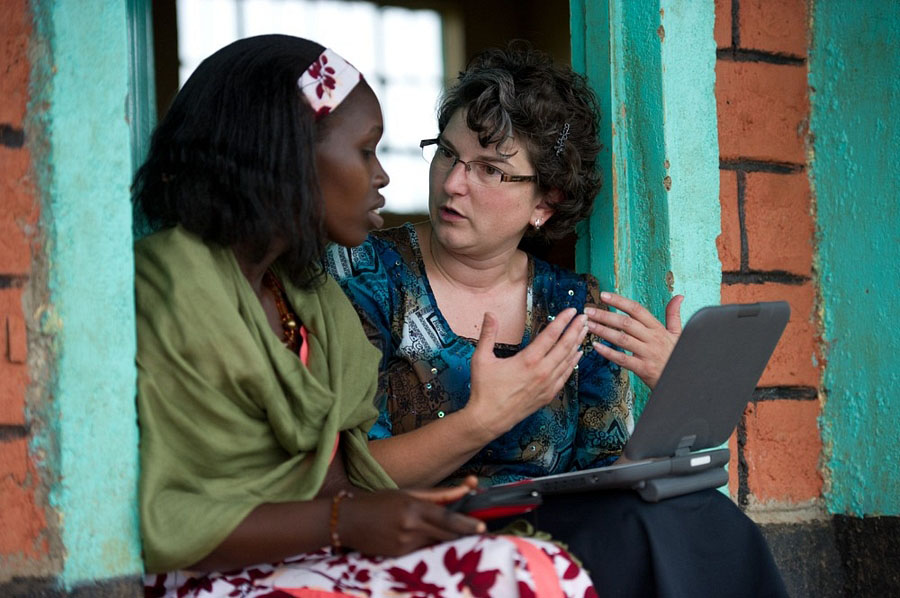
Sara Rhyne, right, shows a teacher in Kilgoris, Kenya, how an electronic reader can be used in her classroom. Rhyne, a graduate of Appalachian's master's degree programs in instructional technology and library science, traveled to Kenya twice with the non-profit organization Worldreader, which donated the devices to the school. Image by Jon McCormack and provided through a Creative Commons License
"One of reasons this project has worked well is that the cell network is very prevalent in Kenya and most teachers have some experience with cellphones and downloading information. Teacher's cellphone skills transfer easily to the e-readers," Rhyne explained. The school has no electricity, so a generator and solar chargers were provided to recharge the e-books' batteries.
Rhyne, who earned a bachelor's degree in literature from UNC Asheville in 1996, said, "I ended up in public schools in a roundabout way." She worked for a time as an historical interpreter at Old Salem in Winston-Salem. But wearing period costumes wasn't something Rhyne wanted to do long term. She worked as a teacher's assistant, in a school computer lab and as a public information officer in Davie County schools before settling into an instructional technology facilitator role.
A constant throughout Rhyne's different jobs has been her love of literature. "I love literature, it has always been my thing, children's and young adult's literature in particular," she said. "I want to make sure students have a love of literature, too."
In 2007, she earned a master's degree in instructional technology through Appalachian's off-campus degree program in Caldwell County and began teaching teachers how to best implement new technologies in the classroom, and teaching students how to use digital information to become global citizens and lifelong learners. She also has helped implement the use of e-readers in the district's early college classes.
Rhyne has seen different types of technology change education in the public schools in Davie County, but thinks the addition of the e-readers alone will have a greater impact on Kenyan education, pedagogy and information access.
"Stories are what connect us as cultures and individuals. Through knowing one another's stories, we become global citizens," she said.
She wrote in a blog about the Kenya experience that, "Yesterday was the first day that I witnessed the kids getting to explore the e-readers on their own. It was magical. For the first time, the kids had 'free reading time'—where they could independently explore and read whatever they wanted and then read it simultaneously aloud. One pair got to the end of their book, looked at each other and exclaimed: 'Yeah! Let's pick another one!'"
What do you think?
Share your feedback on this story.
About the Department of Leadership and Educational Studies
The Department of Leadership and Educational Studies at Appalachian State University prepares traditional and nontraditional students to assume educational leadership roles in community colleges, universities, public schools, public libraries and related educational settings through active scholarship, reflection, professional discourse and interdisciplinary programs of study based on the integration of theory and practice. The department, housed in App State's Reich College of Education, offers a doctoral program in educational leadership, as well as support courses in educational foundations and research. Learn more at https://les.appstate.edu.
About the Reich College of Education
Appalachian State University offers one of the largest undergraduate teacher preparation programs in North Carolina, graduating about 500 teachers a year. The Reich College of Education enrolls more than 2,000 students in its bachelor’s, master’s, education specialist and doctoral degree programs, with offerings that span multiple fields — from teacher preparation, counseling, and therapy, to higher education, school and student affairs administration, library science, educational leadership and more. With over 10,000 alumni employed in North Carolina public schools, there is at least one Reich College graduate in every county in the state. Learn more at https://rcoe.appstate.edu.
About Appalachian State University
As a premier public institution, Appalachian State University prepares students to lead purposeful lives. App State is one of 17 campuses in the University of North Carolina System, with a national reputation for innovative teaching and opening access to a high-quality, cost-effective education. The university enrolls more than 21,000 students, has a low student-to-faculty ratio and offers more than 150 undergraduate and 80 graduate majors at its Boone and Hickory campuses and through App State Online. Learn more at https://www.appstate.edu.
